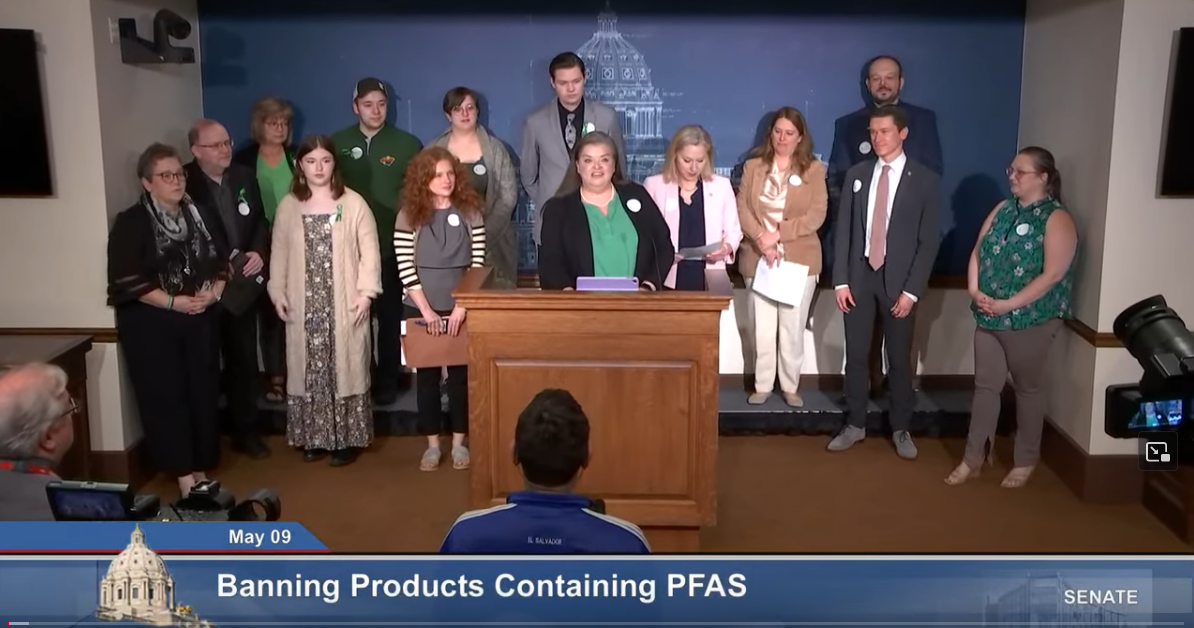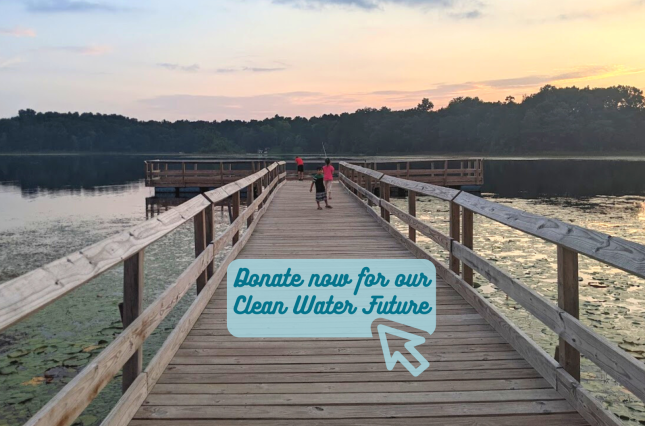
ST PAUL -- Environmental organizations, advocates, and lawmakers gathered for a press conference celebrating the PFAS language agreed upon in the omnibus environment, natural resources, climate, and energy finance and policy conference committee for HF2310 on Thursday, May 4. The language includes a non-essential use ban on products with PFAS, a plan to phase out PFAS from firefighting foam, and a requirement for companies to disclose if products they sell in Minnesota contain PFAS.
Perfluoroalkyl and polyfluoroalkyl substances (PFAS), known as “forever chemicals” because they bioaccumulate in bodies, is linked to thyroid issues, low birth weight, low IQ in children, preeclampsia, cancer, and more. PFAS do not break down over time and are highly dangerous when incinerated.
This language is the result of years of work by environmental organizations, advocates, and lawmakers. “Today is the first day of a new era in Minnesota for clean water and healthier lives,” said Representative Jeff Brand, author of the non-essential use ban in the House. “The PFAS tap will soon be turned off so we can focus on cleaning up the contamination.”
“I’m proud to carry the legislation to ban PFAS in Minnesota. We need to stop the introduction of any more of these ‘forever chemicals’ into our environment and ban their use in consumer products,” said Senator Judy Seeberger, who carried the language in the Senate. “We know PFAS causes health effects, and we heard the compelling testimony of Amara Strande in the legislature as she urged us to take action. I’m proud to do just that, and only wish Amara was here to see this bill signed into law. I will continue to fight to ban PFAS that Amara began, and I won’t stop until Minnesota is a PFAS free state.”
“Minnesota is poised to be a leader globally regarding turning off the tap and preventing PFAS contamination in the water,” said Avonna Starck, Minnesota state director for Clean Water Action. “This legislation has bipartisan support and will save lives and taxpayer dollars.”
Dana and Michael Strande, parents of Amara Strande, watched the conference committee hearing online and attended the press conference. Their daughter battled fibrolamellar carcinoma, a rare liver cancer, for over 5 years. She spent her last months of life testifying in the legislature about the dangers of PFAS, believing her illness was linked to exposure. She grew up in the east metro PFAS plume area and attended Tartan High School, an area known for its high rates of cancer.
“We are thrilled that this legislation is moving forward and we pray that no other family has to suffer the loss of a loved one because of PFAS exposure that is completely preventable. Amara’s cancer impacted her sister, Nora, and everyone who loved her. This has to stop. We’re grateful the legislature is doing the right thing,” they said.
Amara passed away two days before her 21st birthday and three days before the House voted on HF3201.
“Minnesota is the origin story of PFAS so it is wonderful to be the place it ends,” said Andrea Lovoll, legislative director for the Minnesota Center for Environmental Advocacy. “This chemical is dangerous to humans and we are thrilled that the legislature prioritized action and that the governor included addressing the PFAS crisis in his budget.”
Once the omnibus bill is signed by Governor Walz, Minnesota will have the most comprehensive legislation regulating PFAS in the nation.
###
About Clean Water Action
Clean Water Action works at the national, state and local level to develop strong, community-based environmental leadership and bring together diverse constituencies to work cooperatively for policies that improve lives and protect water. Clean Water Action has been in Minnesota since 1982, focused on finding solutions to health, consumer, environmental and community problems and working to protect our water and our people. Learn more at www.cleanwater.org/MN
About the Minnesota Center for Environmental Advocacy
For nearly half a century, MCEA has worked to enact and enforce smart environmental laws in Minnesota. With offices in St. Paul and Duluth and a team that includes some of the state's foremost environmental law and policy professionals, MCEA educates about issues and supports communities in their fight to protect their environment. MCEA is unique in Minnesota in its use of top legal expertise in the pursuit of environmental justice. For more information, visit www.MNcenter.org

Make a Special Gift to Protect Clean Water in Minnesota
